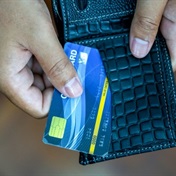
BUYING on credit is not always a bad thing and experts agree that at one point in your life you ought to take credit because not many people have a lump sum lying around for huge purchases. However, the issue starts when you can’t keep up with repaying your debts. The first sign that you’ve dug yourself into a deep debt trap is borrowing from Peter to pay Paul or totally ignoring calls and letters of demand from debt collectors.
GETTING OUT OF DEBT
Debt is something that can happen to anyone, especially as the cost of living increases but salaries often don’t. “Being in debt can seem overwhelming, but with good advice and expert assistance, it is possible to get out of it. No matter how far gone the situation seems, it’s critical to take that first step and ask for help,” advises Ian Wason, CEO of DebtBusters, a debt management company.
READ MORE: How I got myself R400K in debt - and why you shouldn't
He says knowing the difference between good and bad debt will come in very handy when you make financial decisions because it’s almost unheard of that one can cruise through life without taking credit to get ahead. If you cannot afford something, don’t buy it and never make the mistake of taking out a loan to pay off existing debt. “Set up a budget and stick to it.
Start by making a list of your household income, expenses, debts and balances and weigh them up against one another. See where you can trim the fat and take it from there,” he suggests. There is hope that you can turn this situation around. Ian says debt counselling and debt consolidation are effective ways you can start working your way out of debt and getting your financial life back on track.
STEPS TO TAKE
National Credit Regulator’s agony aunt, Mama Siza, gives you quick tips on how to handle your debt predicament better and eventually become credit wise.
- Don’t ignore your debt – Resolve to deal with your indebtedness using means at your disposal. Get in touch with your creditors and explain your situation. Remember creditors would rather receive small payments from you than none at all, so negotiate lower installments. Don’t be threatened or bullied into making promises you can’t fulfill, you have rights. Avoid dealing with your financial issues in secrecy or through denial; make your family members aware of your situation. Cut down on unnecessary expenses and luxuries.
READ MORE: How my R85K gift to my aunt for raising me crippled me for 7 years
- Prioritise and pay your debts – Formulate a budget representing all your income and monthly commitments. First pay the bills on essentials such as housing, electricity and insurance. After essentials, pay your day-to-day expenses like travel and food. Give priority to those debts that carry the highest interest rate and then the rest in descending order.
- Avoid borrowing to pay off debt – At all costs avoid using credit cards to pay existing debt. Don’t take on extra credit cards or store cards. If you get retrenched, use the retrenchment package to pay off debt.
- Cut down on expenses – Eliminate non-essential items. Short-term discipline will ensure long-term financial stability for you and your family. Make a list differentiating between your genuine need and things you merely want and stick to it. It’s a mistake to cancel important car and household insurance policies. Rather target luxuries as this will save you a lot of money. Surrender goods for which you are no longer able to make payments for before you become over-indebted. Where possible, avoid paying others to do things you can do yourself such as washing your car and taking care of your garden, among others.
- Start saving – Plan to save money every month. This means paying yourself first. With the money you put aside, create an emergency fund for unforeseen situations which may arise. Be consistent and accurate with your budget and keep what is left over.
WAYS TO PAY OFF YOUR CREDIT CARD
A structured, disciplined approach can help you get out of credit card debt and the following steps may assist you to get out of the red if you have overspent on your credit card:
- Take stock of all your debt – Be brutally honest with yourself and know exactly where you stand.
- Create a budget – The key is to be realistic when you create a budget. You’ll have to make some sacrifices but be sure to give yourself a bit of breathing space.
READ MORE: Local couple has wedding worth R2000 - and now they're debt free
- Track your costs – Write down all your regular, committed expenses and track other variable expenses such as restaurant meals, entertainment and travel. This will serve as the foundation for your budget.
- Choose your payoff strategy – There are two common credit card payoff strategies. The first is to plough all your extra cash into the highest-interest card while paying the minimum on the others – which is the fastest way, overall, to lower your debt. Once the first card is paid off, you have even more extra cash, and should apply it to the card with the next highest rate, and soon, creating a debt payoff snowball effect. A second strategy is to pay off your card with the lowest balance first while continuing to pay the minimum on the others. While this is not the most cost-effective way to banish your debt, it’s the fastest way to eliminate debt on a single card.


















